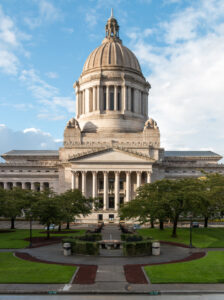
OLYMPIA — Washington state lawmakers are considering a new approach to funding road projects — one that would charge drivers based on their vehicle’s fuel efficiency rather than how much gas they buy.
The proposal, introduced by House Transportation Chair Rep. Jake Fey, aims to address the state’s shrinking gas tax revenue. For more than a century, Washington’s roads have been largely funded by taxes at the pump. But as more drivers switch to fuel-efficient, hybrid, or electric vehicles, revenue has failed to keep pace with the rising costs of infrastructure projects and increased traffic.
Under Fey’s plan, drivers of vehicles averaging less than 25 miles per gallon wouldn’t see any additional charges. However, owners of more fuel-efficient cars would begin paying a new annual Highway Use Fee, ranging from $7 for a vehicle with 26 mpg efficiency to $94 for cars getting 50 mpg. The fee would replace the current $75 annual hybrid registration fee for hybrid drivers, but electric vehicle and plug-in hybrid owners would be exempt from the new charge.
Fey said the state needs to adapt to a future with fewer gas-powered cars. “If we want to maintain and improve our roads, we need a funding model that reflects how people are driving today,” he noted.
However, the proposal has drawn criticism from privacy advocates who are concerned the state could eventually move toward tracking individual drivers’ mileage using digital devices. Fey’s current proposal does not include per-mile tracking, but some worry the fee could lay the groundwork for such a system.
Additionally, the plan includes a nine-cent hike to the state’s gas tax starting July 1 — a move that has prompted further debate.
Rep. Andrew Barkis, the ranking Republican on the House Transportation Committee, said he supports the concept of the flat fee model over a mileage-based system but opposed Fey’s broader transportation budget. Barkis argued the state should instead tap into existing revenue sources like sales tax from vehicle purchases and the Climate Commitment Act, rather than raising fuel taxes and fees.
“This is a good model that could evolve into a full road usage charge down the road,” Barkis said. “But right now, adding fees on top of a gas tax increase is not the right move.”
The proposal is expected to be at the center of legislative discussions in the coming months as the state seeks long-term solutions for road funding.





